Read this article for a full definition of, as well as ways of using, ‘Trajectories from COVID-19’, designed by Forum for the Future.
How will we emerge from the pandemic?
As the COVID-19 pandemic continues to cause widespread disruption around the world, how are we all responding, what are the implications for creating a sustainable future, and where exactly do we go from here? As momentum behind calls to ‘build back better’ grows, what does that look like and how do we do it? Based on desktop research, multiple interviews with leaders across business, philanthropic and not-for-profit organisations, and analysis of the latest signals of change, Forum for the Future has developed four distinct trajectories emerging from the pandemic.
What are the Trajectories from COVID-19?
The Trajectories from COVID-19 are a guide to understanding what may happen next, to detecting early signs of the sort of shift we might see, and anticipating some of the consequences. Each trajectory is based on a different mindset:
- Transform sees us take full advantage of the disruption we’re all experiencing to emerge into a more regenerative, resilient and sustainable world; one that fundamentally recognises that planetary health equals human health and that new norms are not only desirable, but possible
- Compete and Retreat sees a future in which we retreated to ‘life as we knew it’, locking in unsustainable practices and prioritising resources for the few over the many
- Discipline sees a future in which greater tech-enabled control is needed to maintain public health, security and growth – underpinned by a ramped up use of tech, an increase in surveillance and a return to some form of globalisation
- Unsettled is a future we’re not yet able to imagine, based on extended periods of disruption.
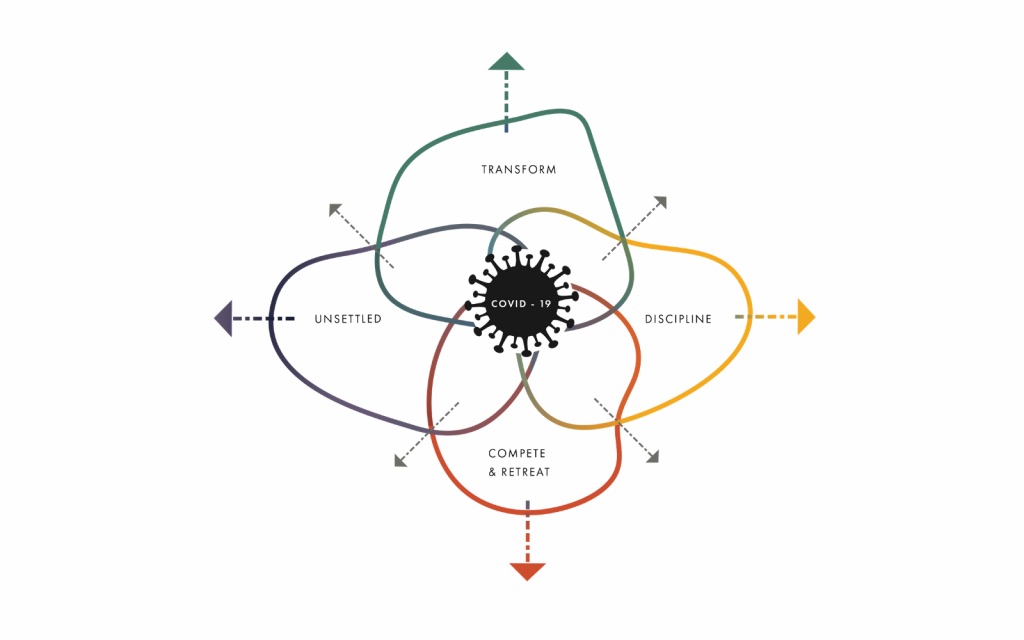
In-depth: Transform
Prevailing mindset: planetary health equals human health; our fates are deeply interconnected. Deep change is actually possible, desirable and happening and we accept that we cannot go back to ‘before’.
What might happen? Deep levels of dysfunction, structural inequality and gross inequity are exposed globally, regionally and locally by the COVID crisis. But critically, we acknowledge these issues – sparking intense attempts to address them and use pandemic response efforts to become more resilient, prepare for the decade ahead, and work to accelerate zero carbon and just transitions.
Transform sees a lot of decentralised, distributed responses from communities alongside pioneering businesses visibly acting on and responding to a deep sense of purpose. Politics slightly lags behind but political leaders eventually respond to the deeply-changed public mood (starting at city and local level).
Regenerative culture begins to emerge, and deep economic reform begins as the world attempts to emerge from the crisis.
In-depth: Compete and Retreat
Prevailing mindset: There is not enough to share; we must retreat to protecting our own kind; we must prevail over others / others are tainted / others must be kept out so that there’s more for us.
What might happen? A largely divisive trajectory in which dynamics come into play from nationalist leaders across the world and overwhelm attempts at international collaboration.
The world chaotically regionalises, supply chains shorten and we see a strong focus on national health, food and energy security. Compete and Retreat sees a continued regression, moving further away from a sense of ‘global community’.
COVID-19 and other emerging pandemic threats are seen as ‘foreign’ taints. The developing world is only assisted through the very narrow lens of national self-interest and is hit very hard. Some vulnerable, middle-income countries may collapse.
Meanwhile, at local level in many rich countries, some aspects of Compete and Retreat prevail that feel strangely positive, including a returning sense of national unity and cohesion and pulling together for the national good, alongside a renewed focus on local economies, production and jobs.
Watch the Compete & Retreat film
In-depth: Discipline
Prevailing mindset: Greater control is required to maintain public health, safety and security and just as importantly, keep growth and global interconnection going ‘as normal’. We are prepared to relinquish privacy concerns for this
What might happen? We see a heavy use of tech and mass surveillance in an attempt to get back to a form of ‘normal’ and keep globalised capitalism going.
A Chinese-style surveillance model spreads across many countries, with China becoming much more powerful geopolitically; power becomes even more centralised in trans-national tech companies and their partners; automation accelerates.
We may also see centralised efforts to use the crisis to effect ‘change for sustainability’ by, for example, normalising remote working, ending business travel, and extending tracking to assist behaviour change.
Watch the Discipline Trajectory film
In-depth: Unsettled
Prevailing mindset: There is no new normal and much of our previous logic and thinking can no longer help us. Radical resilience, adaptability and intuitive opportunism will give an edge.
What might happen? Cascading, colliding and compounding events have unexpected consequences that continuously wrong-foot institutions and derail attempts to establish a stable or inflexible ‘new normal’. Continuous discontinuity from crises and events (across climate, politics, society, technology and more) lead to a slow realisation that there will never be a new normal and the world is now unavoidably volatile beyond all previous experience.
Watch the Unsettled Trajectory film
Which trajectory must prevail?
Forum strongly believes that Transform must prevail if we are to create a world that is truly regenerative; one that is transformed by systemic change and realises a just transition towards a net zero global economy.
Putting the world on this trajectory will require strong and decisive action across business, government, the philanthropic sector and civil society. It won’t be easy but COVID-19 has given us the opportunity to tackle the profound structural weaknesses in our economy and society.
The more attention we pay to Transform, the greater the chance of it becoming our future.
Comparison of trajectories
View a detailed Trajectory summary table highlighting their respective characteristics alongside the similarities and differences.
How to use the trajectories as a strategy tool?
Trajectories are a living and flexible systemic futures tool to help change-makers work with this moment of deep discontinuity to deliver transformational change for sustainability. They have many possible uses, including:
- Tracking and making sense of the changes happening around us.
By tracking signals of change and dominant narratives as they evolve, the trajectories can provide a framework for dealing with the ‘overwhelm’; with the complex and often contradictory nature of what is happening in this moment.
View the latest signals and insights - Informing your strategy.
The trajectories can be used to build a nuanced understanding of key challenges your organisation may need to traverse in the 2020s and how to respond to them. They are useful for testing an existing strategy, or developing a new one, making better decisions to understand the outcome you want, and exploring your organisation’s role in a changing system. - Creating the narratives and the framing to drive collective action. No matter which version of the future we find ourselves in, the trajectories can support alignment with partners, raise collective ambitions, and help to build collaborations for transformation.
At Forum for the Future, we’ve been using the trajectories with a whole host of different organisations from designers, foundations, network organizations and corporations. Using them as inspiration for team sessions to a framework for strategy work.
We used Trajectories from COVID-19 to map out the future of the travel industry – read the case study.

“The actions we take today have a profound influence over tomorrow. By embracing the ‘Transform’ trajectory, and using our collective voices, we have the opportunity to inspire action and truly ‘build back better’. Together, working across sectors, we have a greater chance of innovating and accelerating the work and creating positive, equitable and lasting change for people and the planet.
Amanda Nusz, Target’s vice president of corporate responsibility and president of the Target Foundation
Why futures for sustainability?
Futures work to help organisations and entire sectors grapple with uncertainty and change. By revealing the complex interplay of dynamic trends around us, and identifying risks and opportunities associated with this interplay, we can understand where and how to act now for long-term resilience and success.
If you’d like to use Trajectories from COVID-19 to support your work or organisation, get in touch with Louise l.armstrong@forumforthefuture.org
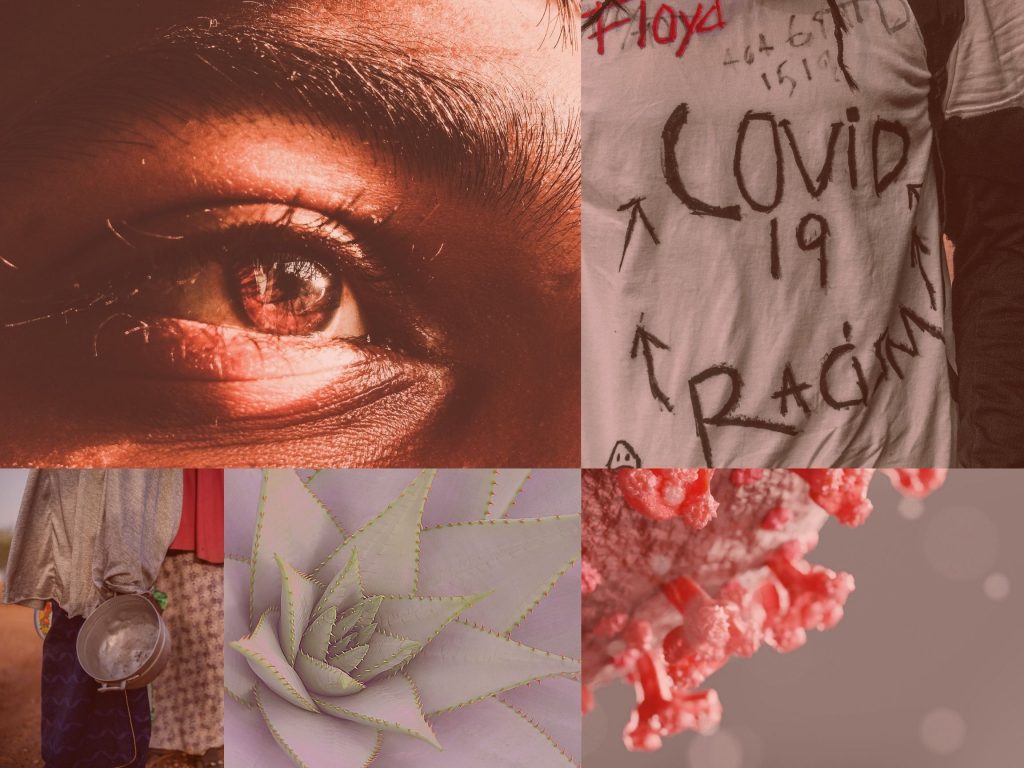
We are continuing to track signals related to each trajectory in the Live Research project: Trajectories from COVID-19
Related:



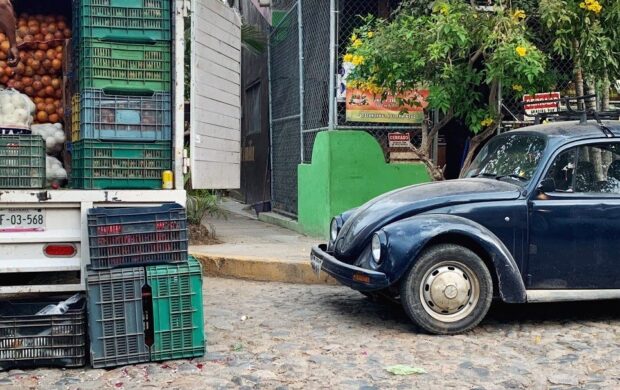
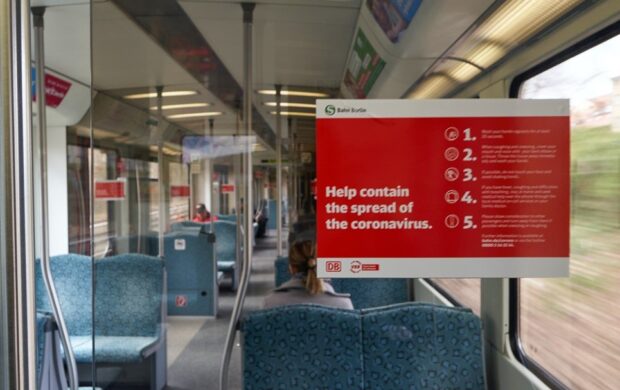
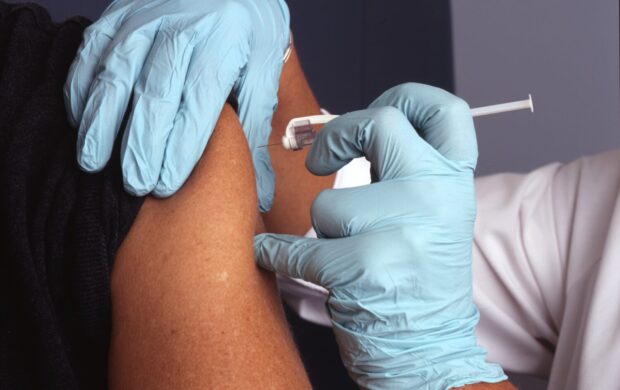


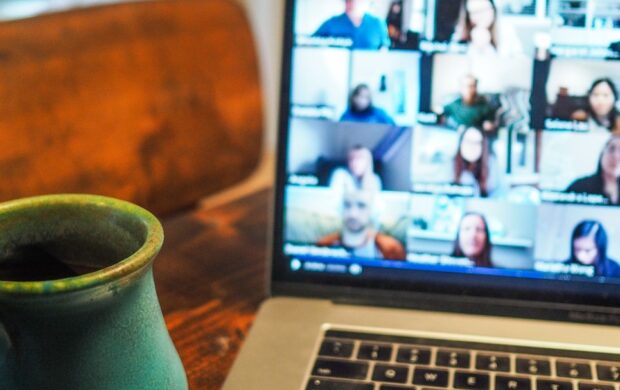
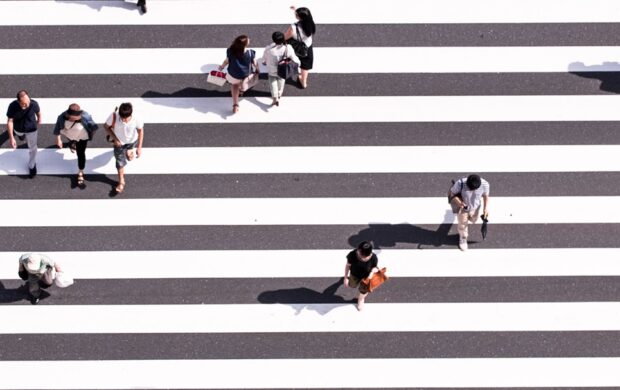

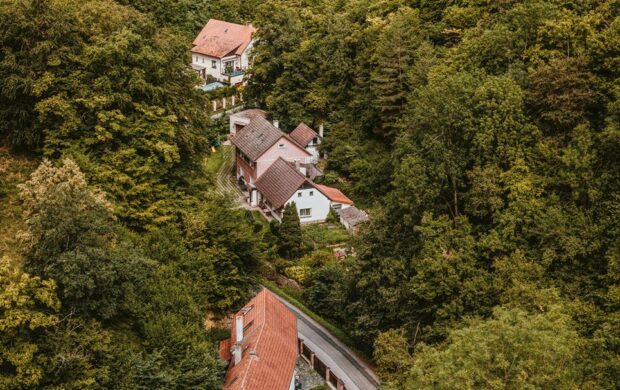
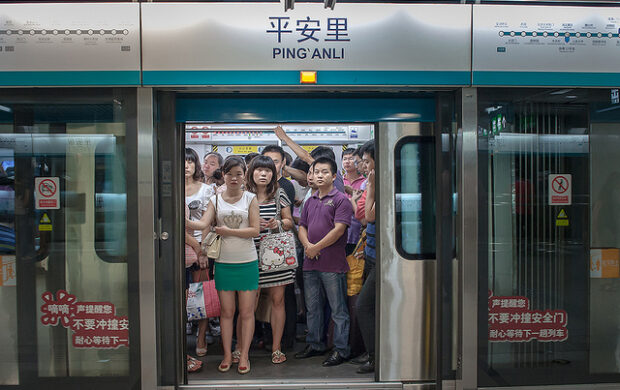
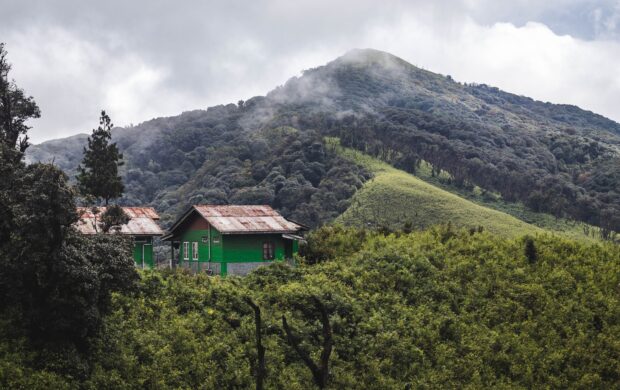
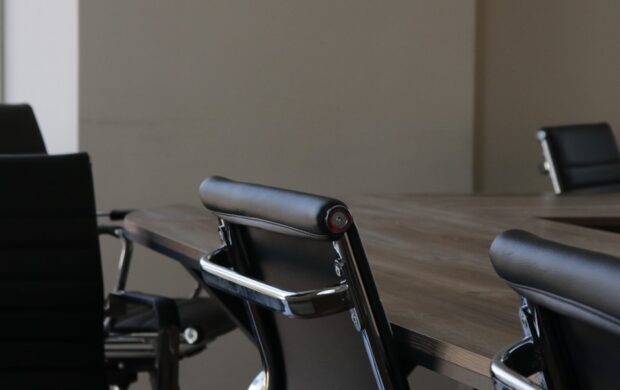
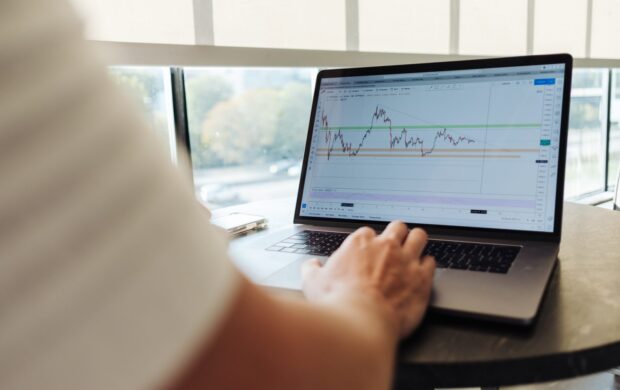
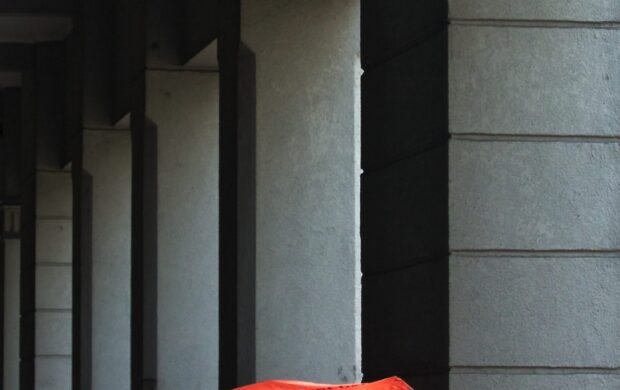




Join discussion